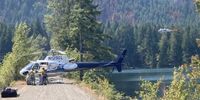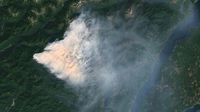When federal immigration agents swept into the heart of Washington’s largest wildfire last Wednesday, few could have predicted the shockwaves that would ripple through the wildland firefighting community. The Bear Gulch Fire, raging through nearly 9,200 acres of rugged terrain in and around Olympic National Park, was already testing the mettle of hundreds of firefighters. But as two crew members were arrested by U.S. Customs and Border Protection (CBP), and dozens more sidelined for hours, the crisis on the fire line suddenly took on a new—and deeply controversial—dimension.
According to Stateline, the incident unfolded on August 27, 2025, when CBP agents, acting on an investigation by the Bureau of Land Management (BLM), intercepted two contracted firefighting crews. The firefighters, who had been told they were going to cut firewood for the local community, found themselves instead confronted by federal agents. The agents, citing discrepancies on the crews’ rosters and time sheets, arrested two individuals for being in the country illegally and removed 42 additional firefighters from the scene. The government also terminated its contracts with the companies involved, though some in the industry dispute whether those terminations were ever formally enacted.
For many on the ground, the operation was almost unheard of. “There’s a lot of brown bodies out there on the fire line,” said Bobbie Scopa, a 45-year firefighting veteran and executive secretary with Grassroots Wildland Firefighters, as reported by Stateline. “When the rumble from this goes around, we’re going to have contractors unable to put out as many crews as they were. We don’t know what the requirement is not to get shipped off by ICE [U.S. Immigration and Customs Enforcement]. Even if you’re a citizen and you look the wrong way, you could still get picked up.”
Wildfire veterans, including Riva Duncan, a former wildland fire chief with more than three decades in the U.S. Forest Service, expressed outrage and disbelief at the timing and manner of the raid. “We’re all talking about it. People are wondering if they go on a fire with this team, if that could happen to them,” Duncan told Stateline. The incident, she said, appeared orchestrated: the two targeted crews—many of them Hispanic or foreign workers on legal H-2B visas—were sent to a remote staging area under the pretense of firewood duty. The division supervisor never showed, and after an hour, unmarked law enforcement vehicles arrived. “I felt beyond betrayed,” one firefighter present at the scene told Stateline, requesting anonymity. “What they did was messed up. They’d been talking in their briefings about building relationships and trust. For them to say that and then go do this is mind-boggling. It boiled my blood.”
California Interagency Incident Management Team 7, which had overseen the Bear Gulch response until that very day, has come under intense scrutiny. Many in the firefighting world suspect the team facilitated the raid by directing the crews to the location where federal agents were waiting. “There’s really no way [the wildfire management team] could not have been involved,” Duncan said. Incident Commander Tom Clemo declined to comment, citing an ongoing investigation, and public information officer Tom Stokesberry would not address whether the raid affected operations.
For the contractors, the fallout was immediate and severe. Table Rock Forestry Inc., an Oregon-based company whose crew was one of those targeted, provided documentation that all its firefighters held legal H-2B visas. Yet, according to Scott Polhamus, secretary of the Organization of Fire Contractors and Affiliates, the entire crew was demobilized and sent home—allegedly over a half-hour discrepancy on a time sheet. “This is not the first time a crew has been called on the carpet for maybe padding their time a bit,” Duncan explained. “You deal directly with the company. It’s just absolutely mind-boggling to treat it as a criminal issue.”
CBP’s official statement insisted that the operation did not interfere with firefighting. But many on the ground, including Duncan, strongly disagreed. “It’s total bulls***,” she said. “Whoever made that statement doesn’t understand the work. To take two crews off of a fire that’s only 13% contained, that seems ridiculous at that point in a fire. That does seem very unusual.” By Monday, September 1, the Bear Gulch Fire had grown to more than 9,200 acres and was only 13% contained, as reported by Oregon Public Broadcasting.
The political fallout has been swift. On August 29, 50 federal lawmakers—including four members of Oregon’s congressional delegation—signed a letter demanding answers from the U.S. Department of Homeland Security, CBP, and BLM. “The two arrests and dozens of firefighters temporarily sidelined during an active wildfire raise questions about the priorities and [judgment] exercised by federal agencies,” the letter read. Representative Andrea Salinas, who represents Keizer—home to one of the arrested firefighters—was especially vocal: “I’m appalled that the Trump administration is arresting firefighters to meet their arbitrary deportation quotas,” she declared in a press release. “These firefighters risk their lives to keep us safe, and this is how Trump treats them. It’s sick and twisted. This does not make us safer or stronger. Border Patrol should not be prowling our national forests to arrest firefighters.”
Salinas further alleged that her constituent was denied his constitutional right to an attorney and a phone call for 48 hours, before being moved from a customs facility in Bellingham, Washington, to the Northwest ICE Processing Center in Tacoma, where he was finally given access to legal counsel. The letter from lawmakers also questioned whether the Department of Homeland Security was adhering to its 2021 promise to avoid immigration enforcement during disaster response.
Washington Public Lands Commissioner Dave Upthegrove, who heads the state’s lead wildfire response agency, also condemned the raid. “[T]he Trump administration’s crude and inhumane approach to immigration enforcement has intentionally and unnecessarily stoked fear and mistrust among members of the public—including firefighters putting their lives on the line to protect our State,” he said in a statement.
For many in the wildland firefighting community, the incident has left a bitter aftertaste. “If you’re a migrant worker and this starts happening, are you going to keep on doing that and risk getting picked up?” Scopa asked. “If [immigration authorities] keep visiting fire camps, we will definitely have fewer contract crews.” The fear, according to many, is that the very people risking their lives to protect communities from devastating wildfires will now think twice before answering the call—leaving the West more vulnerable as fire seasons grow longer and more intense.
As the embers of Bear Gulch continue to burn, the wider debate over immigration enforcement, public safety, and the treatment of those on the front lines is far from extinguished. The trust that holds together fire crews—built on duty, respect, and integrity—has been tested in ways that may echo long after the smoke clears.



